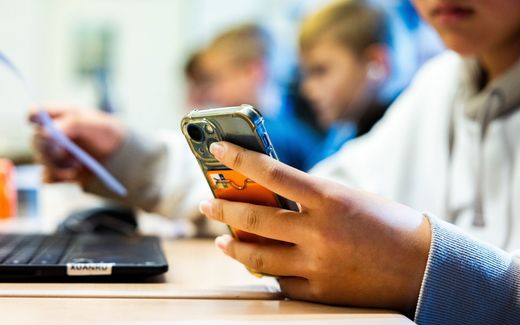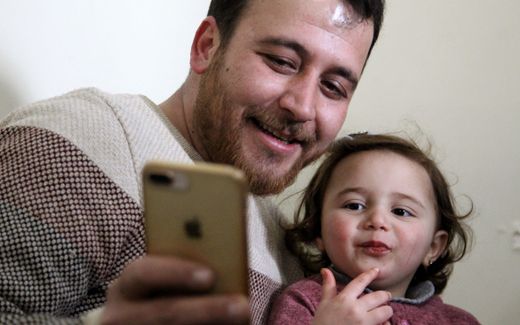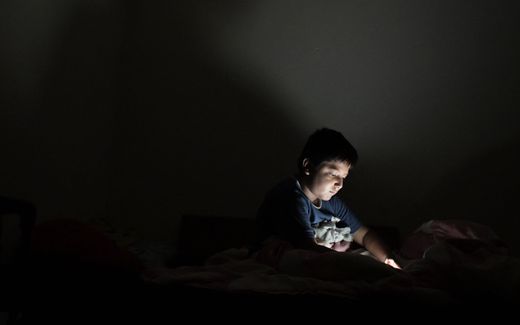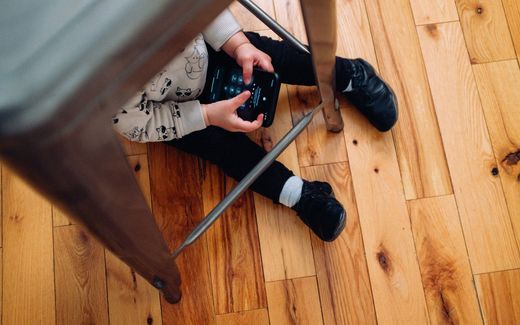School ban on smartphone is winning ground in Europe
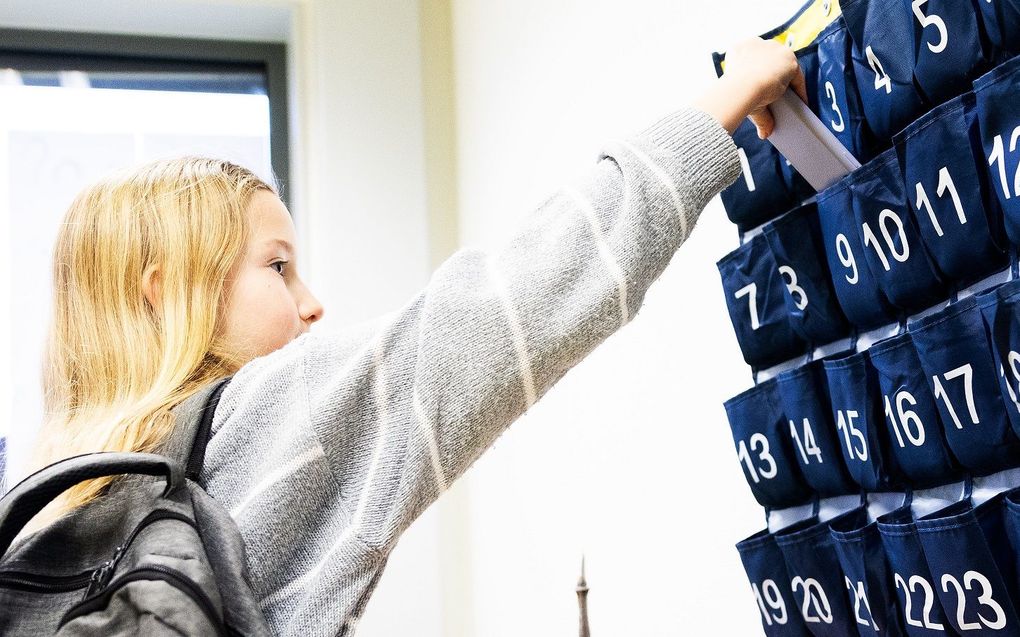
A student puts her phone in a special pouch in the classroom. In several countries, pupils are not allowed to keep their phone with them in school anymore. Photo ANP, Iris van den Broek
European Union
The smartphone is useful. But in school, it impacts social interaction and the concentration of pupils. Therefore, more and more countries ban the device from the classroom.
Receive CNE's weekly newsletter? Feel free to sign up here.
Suddenly, governments all over Europe seem to feel the need to counter the use of the addictive device at school. Several countries start the new school year with a national ban on the smartphone at schools. Others are still considering one. And in countries that do not have a national ban, more and more schools choose to implement one themselves.
Which countries have a smartphone ban at school?
Had one already: Italy, Spain and Albania
Just implemented one: The Netherlands, Hungary, France and Greece
In the process: Belgium, Finland and Ireland
Up to individual schools: Poland, Germany, Denmark, Switzerland, Portugal and Croatia
Politicians point to the decreased amount of social interaction among students and the lack of concentrations as reasons for implementing a smartphone ban at schools. “The use of smartphones and tablets can create tension between students and teachers”, Italy's Education Minister, for example, said. The French Minister of Education explained that she wants to combat online bullying and hatred. Christian school leaders support the bans.
Christian school leaders back the ban
Overall, Christian school leaders in Europe are positive about smartphone bans at school.
Steve Beegoo (Great Britain, Head of Education at Christian Concern) does not have a national ban on smartphones in his country. Yet, he says, that schools can choose to implement one. "Best things practically are the pouches which smartphones are put in so they can't be used", he says. "Or schools and parents buying 'brick' phones for the children."
Laci Demeter (Hungary, Educational Consultant for the Association of Christian Schools International, ACSI) says that a national ban is important if it allows schools to regulate their smartphone use. A “one size fits all” approach is difficult to implement, he believes. "You cannot ban smartphones if they are the only digital devices in the classroom", he says. "It depends on the extent to which students and teachers have access to digital devices at the school."
Markus Zuberbühler (Switzerland, leader of Initiative für Christliche Bildung, ICB) agrees with Demeter. "I think it makes more sense for each school to decide for itself. The situation is not the same everywhere. For example, in public schools in Switzerland, children usually go home for lunch. At our school, they eat at school. That is why we allow high school students to use their cell phones for 15 minutes at lunch. A national regulation could not take these school-specific characteristics into account."
Wolfgang Stock (Germany, Association for Evangelical Schools, VEBS) points out that phones cannot be banned completely from the schools. “At many of our Christian schools, children travel long ways. It is for their safety to have phones during that journey. At school, the phones are stored in a box in the classroom and released only at the end of the school day.”
Implementing a ban
Thousands of pupils in The Netherlands, Hungary, France and Greece start this school year at a phone-free school. In The Netherlands, phones will be banned at primary schools now, too, after a ban was implemented at secondary schools last school year. From now on, smartwatches, tablets, and other devices are forbidden in the classroom. The only exemptions are a handicap or a medical reason.

Hungary just launched a new law to ban smartphones from schools. Phone use at schools is forbidden, unless schools have a policy that specifies the educational purposes in which it is necessary to use the device.
France issued a ban a few days ago. Pupils at primary schools cannot use their smartphones during the school day or during extracurricular activities, the French government specifies on its website.
Secondary schools are currently experimenting with a ban. According to The Guardian, the Minister wants to implement a general ban in France in 2025 if the experiment is successful.
After summer holiday ends on September 11, Greek students are required to keep their phones shut off at school. That is reported by Euronews. Students are allowed to bring their phones to school, but must keep them in their backpacks all the time, Education Minister Kyriakos Pierrakakis elaborated.

Italy, Spain and Albania already had a smartphone ban. In Albania, the ban has existed already several years. Spain banned smartphones from primary schools last January. Secondary schools are to limit smartphone use to educational purposes only, El Pais reported at the time. However, they are recommended to bring phone use back to zero as well.
This year, Italy tightened its smartphone ban at schools, which has been in place since 2007. Non-academic use of smart devices has been forbidden for many years. However, the new law forbids academic use of smartphones as well, Euronews writes.
According to Wanted in Rome, the ban applies to primary school and junior high school. Students are still allowed to use tablets or computers, but only under the supervision of a teacher.
Education Minister Giuseppe Valditara announced that homework will now be written down in a paper agenda. Although parents can still check the homework of their children online, he emphasised that children must "get used to writing again, to the relationship with pen and paper."
Oggi sono state firmate due circolari con importanti novità:
— Giuseppe Valditara (@G_Valditara) July 10, 2024
- a scuola divieto di utilizzo del cellulare - anche a scopo didattico - fino alla terza media;
- torna il diario cartaceo per gli studenti, mentre i genitori continueranno a utilizzare il registro elettronico. pic.twitter.com/tZdPvuSLjE
Ban in progress
Belgium, Finland and Ireland are currently considering a ban on smartphones in schools. In Belgium, the new Walloon government has included a ban in their coalition agreement, as reported by Politico. The devices will be forbidden at primary schools. Secondary schools will be encouraged to implement a ban for the first three grades.
Finland is preparing itself for a smartphone ban in schools as well. Currently, the Ministry of Education is drafting a law for this, Yle writes. Education Minister Anders Adlercreutz said that it is uncertain whether they will plead for a full ban or simply for more authorities for teachers to forbid the use of phones in their classrooms.

In the meantime, the Finnish National Agency for Education already strongly recommends schools to prohibit the devices during classes and restrict the use of them during the breaks, Daily Finland reports.
Ireland is also busy with options for banning smartphones from schools and limiting their use among children. At the end of August, Health Minister Stephen Donnelly called for a blanket ban on smartphone use under the age of 16. Before that, Education Minister Norma Foley proposed to ban smartphones from all primary and secondary schools, Gript writes.
No ban, but individual measures
In Poland, Germany, Denmark, Switzerland, Portugal and Croatia, there is no national ban on smartphones in schools. However, in these countries, individual schools take measures to limit the use of the device on their premises. In Denmark, for example, up to 88 per cent of the schools have banned the smartphone, as reported by PhoneLocker.
In Switzerland, some cantons are considering a smartphone ban in schools, NZZ writes. The Thurgau Cantonal Parliament received an interpellation on the topic to initiate a discussion. It must now come with an answer on whether it supports a ban or not. The Lucerne government deals with the same issue. According to NZZ, proposals for a smartphone ban at schools are also on the table in Zurich, Basel and Solothurn, among others. Some schools do not wait for an official ban, but implement one themselves.
In Portugal, there are voices that call for a national smartphone ban and restrictions on the use of digital textbooks, Observador writes. However, the government holds on to a decentralised policy that gives schools the authority to choose their own regulations.
In Croatia, it is also up to the individual schools to implement a ban on smartphones on their premises. More and more schools do so, Euronews writes. Research shows that an overwhelming majority of 85 per cent of teachers are in favour of a national ban.
Related Articles



